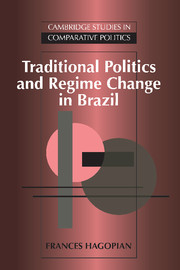Book contents
- Frontmatter
- Contents
- List of tables and figures
- Preface
- Glossary of abbreviations and Portuguese terms
- 1 Introduction: Traditional politics, new authoritarianism
- 2 Oligarchical power and traditional politics in Minas Gerais
- 3 The modern political economy of traditional politics
- 4 Bureaucratic authoritarianism and the state elite
- 5 Back to patronage: State clientelism in Minas Gerais
- 6 Authoritarian politics and traditional elites
- 7 The traditional political elite and the transition to democracy
- 8 Continuity in change: Brazilian authoritarianism and democratization in comparative perspective
- Appendix: The Minas elite
- References
- Index
Preface
Published online by Cambridge University Press: 06 January 2010
- Frontmatter
- Contents
- List of tables and figures
- Preface
- Glossary of abbreviations and Portuguese terms
- 1 Introduction: Traditional politics, new authoritarianism
- 2 Oligarchical power and traditional politics in Minas Gerais
- 3 The modern political economy of traditional politics
- 4 Bureaucratic authoritarianism and the state elite
- 5 Back to patronage: State clientelism in Minas Gerais
- 6 Authoritarian politics and traditional elites
- 7 The traditional political elite and the transition to democracy
- 8 Continuity in change: Brazilian authoritarianism and democratization in comparative perspective
- Appendix: The Minas elite
- References
- Index
Summary
Fifteen years after it had been established in 1964, most observers believed that the Brazilian “bureaucratic-authoritarian” regime had marginalized economic and political elites. Indeed, in a survey of the literature as of 1979 on post-1964 Brazil, I detected not one mention of the survival of the country's “traditional elites.” Accordingly, when I embarked on this study, I had no reason to doubt that they had fallen; I wondered only if and how they might have protested their fate, and if their presumed opposition, perhaps in alliance with other subaltern forces, to military-technocratic rule may have been consequential for regime instability. I was naturally disconcerted, then, in an interview for a Social Science Research Council dissertation fellowship, when one of the members of the screening committee, a historian familiar with the Brazilian hinterlands, badgered me to defend the usefulness of a study that was bound to uncover what everyone already knew – that traditional elites persisted throughout Brazil.
In struggling to reconcile these two pictures – one of a major, if temporary, revolution at the highest echelons of the national Brazilian state, and one of remarkable continuity at lower levels of the political system – this study became a book about regime change as well as a book about Brazilian politics. More accurately, this book is about two regime changes – one to and one from authoritarian rule. It does not seek to cover old ground on the causes of the breakdown of democracy and transition from authoritarian rule, but rather to explain what regime change ultimately meant for broader political change.
- Type
- Chapter
- Information
- Traditional Politics and Regime Change in Brazil , pp. xi - xvPublisher: Cambridge University PressPrint publication year: 1996

